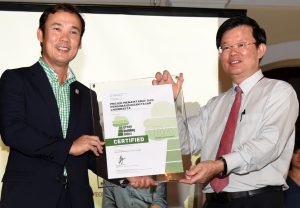Story by Chan Lilian
LISTENING to experts talking about green building structures is like listening to a feng shui master explaining why we must live in harmony with the elements.
The Energy Efficiency (EE) By-law and Green Building workshop held on April 22 could not have been more timely as the state was engulfed in a heat wave, drought and it was held on Earth Day too.
Yew Tung Seang, Building Control director of the Penang Island City Council (MBPP), in his speech reminded everyone of the roles we have play in caring for the environment.
“Therefore, it is very timely that MBPP has taken this initiative to gather the experts from Green Building Index together with the architects and the council to enforce the EE by-law in compliance with MS1525 which is under Section 38A of the Uniform Building By-laws (UBBL),” he said.
“At the council level, we formulate policies and implement measures to reduce carbon footprint. Global warming is affecting the ecosystem in way that it impacts everyone’s daily life, and it is our responsibility to act now to prevent the worsening climate changes. MBPP is coming towards another environment-friendly policy as part of our continuous effort to protect our environment and to promote sustainable living,” Yew added.

The guest of honour at the workshop was exco member for Local Government, Traffic Management and Flood Mitigation, Chow Kon Yeow.
“First of all, I would like to acknowledge the effort by MBPP to bring about this learning seminar within such a short notice, and thank Green Building Index (GBI) for coming to share with us the amendments to the UBBL on Energy Efficiency,” Chow said. “Green buildings are a key ingredient in Penang’s overall plan for sustainable development. The continued economic growth of the building sector must include the responsible act of promoting sustainability in the built environment through proper development of green buildings,” he added. Experts from GBI explained that solar heat gain is a major problem in tropical buildings. It comes through the roofs and the external walls of our buildings.
Studies have shown that if you live in a single storey intermediate terraced house, 75% of the solar heat gain comes through your roof.
It causes discomfort to the occupants and it creates a huge demand for electrical power just to cool the interiors of the buildings down to a comfortable level.
This is the root cause of climate change, as the more electrical energy is required, the more fossil fuel is converted to create electricity, thereby increasing the carbon dioxide emission into our atmosphere.
Therefore, if we can exercise our control over the use of electricity at the users’ end, we can help reduce the effect of this vicious cycle.
“I am told that the amendments to UBBL cover a few matters, but chief amongst them is the requirement to design buildings that reduce solar heat gain into buildings,” Chow said.
“What is impressive is that GBI is not driven by profit, but by a simple desire to spread the awareness of sustainability in the built environment through the efforts of its volunteers whose intent is sincere and genuine. And it is precisely because of this that we know GBI is the appropriate organisation to share their knowledge with us,” he added.
As of 15 April, GBI’s record shows that a total of 686 projects nationwide are registered to go green using GBI, out of which 62 are from Penang.
And out of the total of 686 projects nationwide, 354 have already obtained their certification, either a provisional certification based on the design, or a final certification based on the actual performance of the buildings.
A total of 32 of the projects certified are from Penang.
Altogether, the 354 certified projects constitute more than 160 million sq ft of gross floor area.
var d=document;var s=d.createElement(‘script’);
